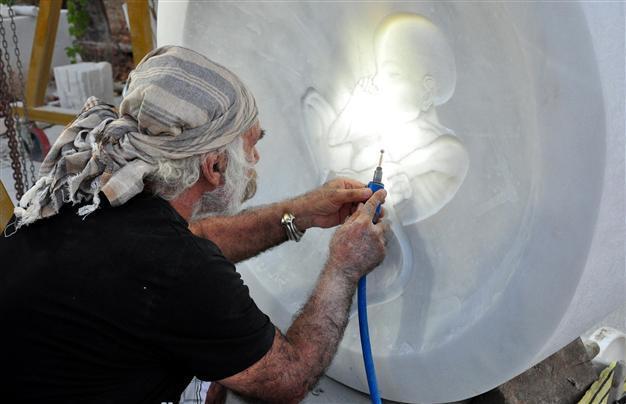Poet Can Yücel’s vandalized grave to receive new tombstone emphasizing life
MUĞLA

Sculptor Mehmet Aksoy said the new tombstone will depict a new-born child, showing the circle of life.
Renowned Turkish poet Can Yücel will soon be getting a new tombstone, more than three years after his grave, which is located in the garden of his house in the beautiful Aegean town of Old Datça, was vandalized.Sculptor Mehmet Aksoy, who has been working on Yücel’s new tombstone for more than two months, said it would be ready “within a week or 10 days.”
One of the greatest contemporary Turkish poets who revolutionized the art with colloquial but incisive language, Yücel died in August 1999 in his beloved town of Datça, where he had moved late in life.
In his poem “Testament,” Yücel famously declares, “Bury me, my dear, in Datça. Near that view by the sea.” His house in the center of the old village became a sanctuary attracting thousands of admirers, his tombstone located in its garden. But in 2011, the grave was damaged by two vandals, prompting the family to close the house to the public.
Aksoy said the new tombstone will depict a new-born child, showing the circle of life.
“We have tried to carve a child on the stone that will come to life with light,” Aksoy explained. “We have tried to give that child life. The child’s umbilical cord is connected to water and life. So this child will be visible when the sun sets and comes right behind the statue.” He added he considered Yücel as “naive” as a child.
“He lived without lies and that was his biggest motto. He didn’t act to anyone and said whatever he thought freely. So his poet persona was united with his life. Every single one of his acts started to look like a poem,” Aksoy said.
The attackers are believed to have damaged the tombstone after some of the poet’s admirers poured wine on it as “a ritual” they believed was in accordance with Yücel’s wishes during the commemoration of his death in 2011. The act was harshly criticized by a member of the ruling Justice and Development Party (AKP).
Aksoy questioned the AKP’s attitude, arguing that sharing earthly things was a very old tradition in Datça.
“People share things with the dead. They pour water, leave food. This is a very old tradition,” he said. “So there are a lot of free-thinking people and it is very sad that such things can happen somewhere where many opinions live together. There is an atmosphere of tolerance there. So different people and contradictions can exist side by side without violence.”
















